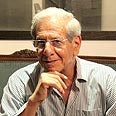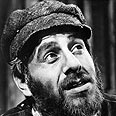

When he's in Israel, Topol stays home. It's not that he's adopting the Arik Einstein model. He does meet up with friends from time to time, and is busy setting up a youth village for ill children in the north and winning prizes. But you won't see him in films, in the theater or on television. Israel's leading actor abroad has been keeping away from the local industry for nearly a decade, at his own choice.
"I get offers all the time, read scripts, receive proposals for theater productions," Topol admits, "but there's nothing that interests me enough, nothing at a good enough level."
Can't they meet your budget?
"No. If there was something I really liked, money would not have been a problem, but I haven't been turned on by anything. There are two scripts I'm reading now, but there's the problem of films which are in favor or against the Jews, and that's one of my measures. I won't play in films that come out against the State, and there have been quite a few of those recently."
This time, Topol arrived in Israel to receive a lifetime achievement award, at the Carmiel Dance Festival of all places. And no, he does not have a glorious dancing career. They just decided to express their support for him.
"I'm the third person to receive this award," he says. "It's better than receiving a slap in the face, isn't it? It's a very nice award, but I don't think it will change my life. I've already received a Golden Globe and an Oscar nomination, but we haven't spoken about that. We tried to hide it as much as possible."
Hide? Today one makes headlines for being nominated in the smallest festival.
"Then it wasn't like today. You didn't brag about such things, because America sounded like something that could ruin you. What do those Americans know about movies? Golda (former Prime Minister Golda Meir) didn't even want us to take 'Sallah Shabati' overseas. She was afraid it would be misinterpreted there.
"I remember the critics wrote at the time that the audience in Israel couldn't stand the film and left in the middle, not before throwing stones at the screen. That was nonsense of course. The audience loved the film."
What about the Israel Prize?
"There are those who deserve it more than me."
Role that changed my life
Topol began his career in the Nahal troops entertainment group, where he played the role of Sallah Shabati for the first time – that same character which would later turn into a successful film and which he is so identified with.
After completing his military service he established the "Green Onion" band together with his good friend Uri Zohar, and after it was dismantled he became one of the founders of the Haifa Theater. And then came the role that changed his life.
"Pashanel (producer Avraham Deshe) said they were planning to bring the production of 'Fiddler on the Roof' to Israel and that I should go see it in New York and decide if I want to play in it. Incidentally, leading actor Zero Mostel decided to make a joke of the show, and I didn't like what I saw. I decided I didn't want the role.
"Then the late (Shmuel) Rodansky stepped into the shoes of Tevye in Israel. I went to see it and said to myself that I was an idiot, because it was a great role. In the meantime, Rodansky became sick and they were looking for a replacement because it was a huge hit. And then his doctor came over and tried to convince me to do it. Naturally, I immediately agreed, and after he returned we split the role between us."

'I try not to work too much' (Photo: Dana Kopel)
And how did the global breakthrough occur?
"I was invited to audition for the musical in London, and learned all the texts and songs in English within three days. When I entered the hall, they announced that 'Mr. Topol is here.' Everyone turned around and didn't understand, because they saw a 30-year-old boy standing in front of them. They asked if I was the one who played the role of Sallah Shabati. I said I was, and they couldn't understand what that old actor had to do with this young boy on stage. I was so excited that as I auditioned I had the most beautiful voice that ever came out of my throat."
Since then, 75-year-old Topol has become Israel's most famous actor abroad, with leading roles in quite a few Hollywood films and BBC series.
"I'm in the last part of my career," Topol admits. "I try not to work too much, not to take more than one project in three years, be it a play or a film. I also try to have a good family life. But when I start something, I do it like it has to be done – eight times a week, sometimes twice a day. Up to now I've performed in almost every country – in the United States, Japan, Australia, across England and in Israel too."
Are there countries you haven't performed in yet?
"I got an offer from Germany, but I firmly rejected it. I don't visit Germany as a principle."
Don’t you get tired being the fiddler on the roof?
"Occasionally I do other things as well, but the great thing about this role is that you can hardly go wrong or fail. Throughout history I remember only one person who managed to fail with it, and I won't mention his name.
"But I do other things as well. I have just done something in a Shakespeare theater, an unusual experience, because it's under the open sky. When the weatherman says it's going to rain, people come with plastic bags and umbrellas and we perform under the rain."
Did you know that the role of Tevye the milkman would build your career?
"I didn't know this would be the role which would accompany me throughout my life, just like I didn't know that 'Sallah Shabati' would be such a successful film.
"When (writer and satirist Ephraim) Kishon presented our band with the first Sallah skit, which was called 'Saadia and the welfare,' we all said that social problems were not suitable to entertain soldiers. Kishon told us, 'You don't understand, it's a very funny skit and the audience will go wild.' The audience did go wild. After the performance ended, Kishon came over to me and said, 'So, you idiot, who was right?'"
Weren't you afraid of being a one-role actor?
"I once sat with Marlon Brando, and he simply cried for close to an hour. He told me he felt poor and miserable, and that no one wanted him, that they were offering him films he wasn't interested in and that he was afraid he was finished in the industry. I told him that a person needed one film in his pocket which was a classic.
"If I had one film like 'On the Waterfront' or 'The Godfather', I would be satisfied. What does a person need more than one hit which enters history? It took him a long time to understand that. 'Fiddler on the Roof' has been seen by more than one billion people. It's inconceivable."
Will you give your last performance as Tevye in Israel?
"Possibly. We'll see."
Won't stop volunteering
The Jordan River Youth Village for ill children, which Topol and other artists have been working on in recent years, will be opened soon.
"The construction took a long time, and we were hit by a missile during the Second Lebanon War, but the dream is being materialized and we have already reached the pilot stage. The village will soon be launched. It's the only village which will operate every day of the year, and we're taking our time so as not to make any mistakes."
How do you choose your volunteering goals?
"They choose me. In 1967, during the waiting period (three-week interval between the Egyptian crossing of the Suez canal into the Sinai peninsula and the outbreak of the Six-Day War), there was a great sense of panic in Israel. During that period I performed in London with 'Fiddler on the Roof,' and two weeks before the war broke out, our military attaché called me and said they urgently needed my help, because there was an organization of artists called Variety, and they had 40 ambulances which could help the fighting in Israel.
"I went to them and they said they did have buses to transfer children, but that because they were an artists' organization they couldn't give it to us for war purposes, but that if we would open a Variety office in Israel, they would let me have them."
So you opened one.
"I opened the Variety Israel organization, and before I managed to bring the ambulances here, the Six-Day War had already ended and I had no choice but to become in charge of this organization in Israel. This is what it's always like. I don't choose what to do, things choose me. Whether with 'Fiddler on the Roof' or 'Sallah Shabati' or the youth village. I'm a lucky man."
- Follow Ynetnews on Facebook















